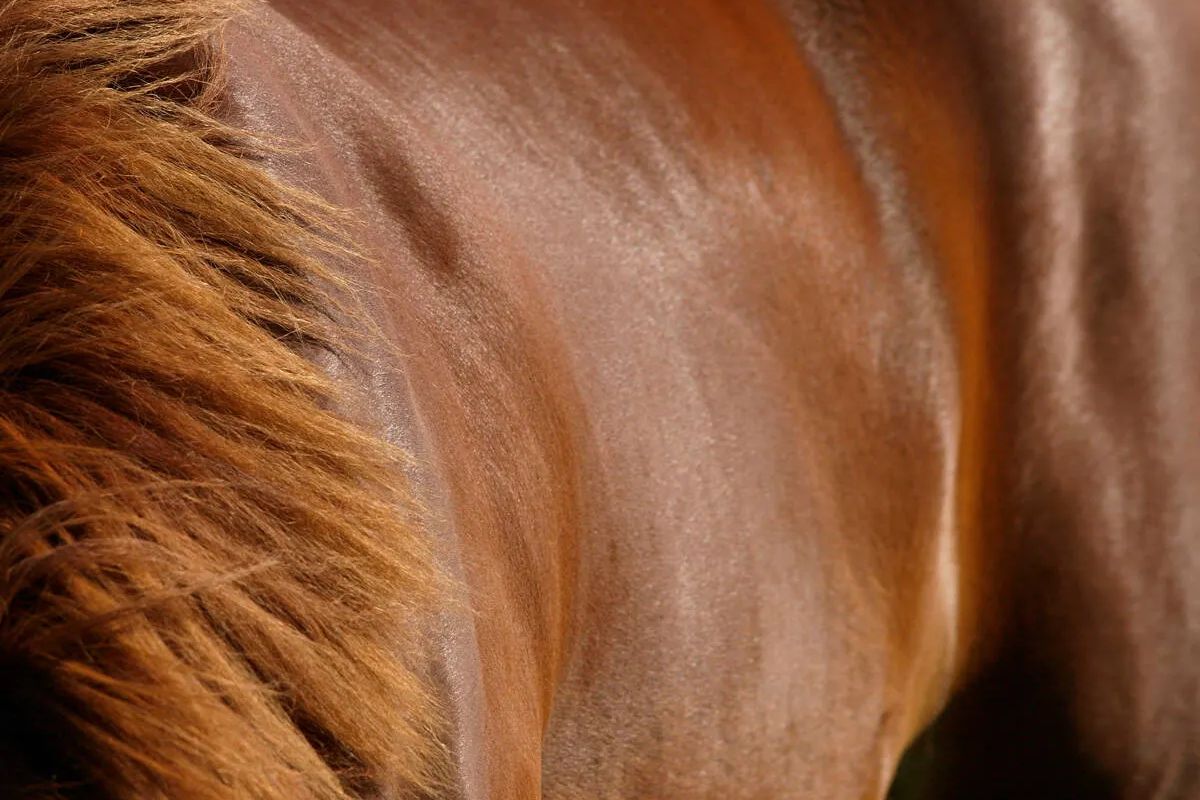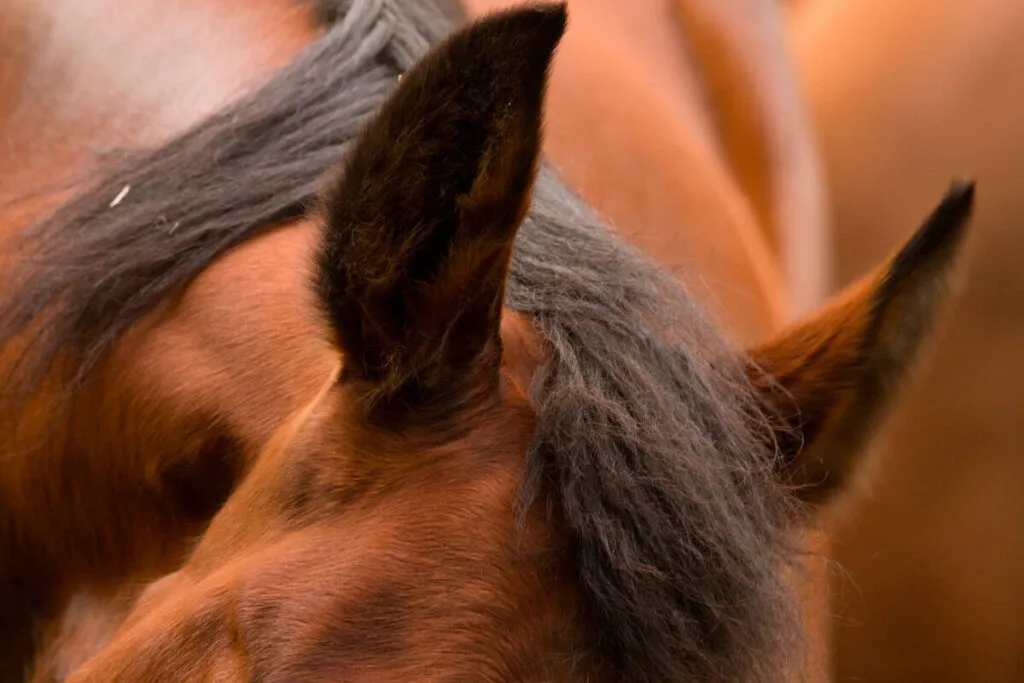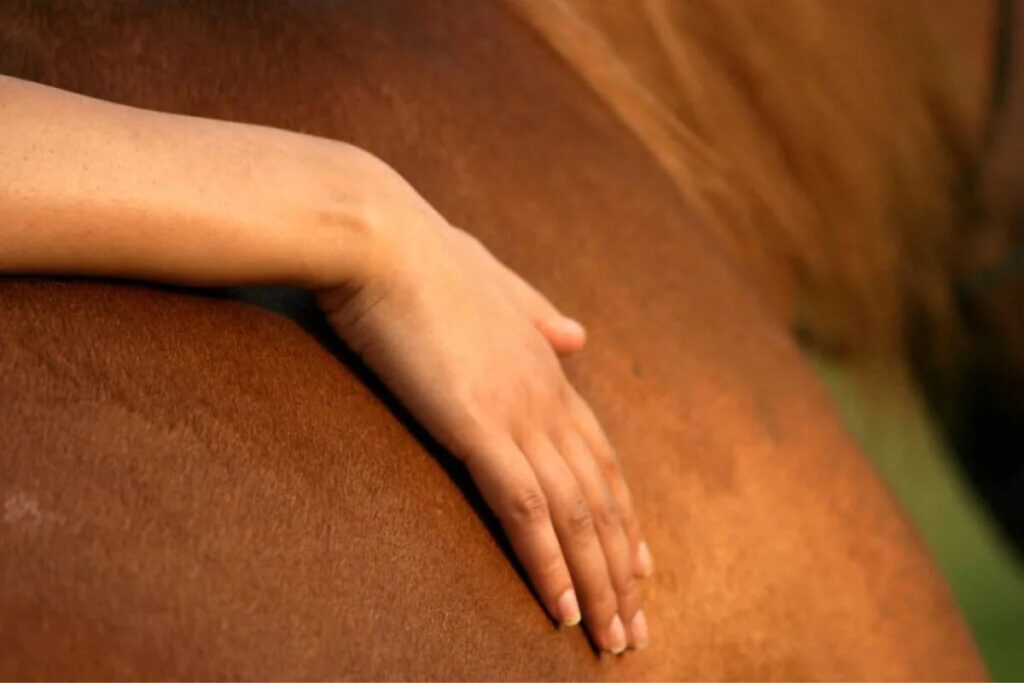Menu

The horse's largest organ is the skin, which requires care and well-being from within to be optimal externally. Horses that lack nutrients, such as vitamins and minerals, often show it through irritated skin. There can be many reasons why horses have irritated skin. It can result from "incorrect" feeding, allergies, things they can't tolerate in the pasture, and much more. We've had a chat with Maja Mandrup Jacobsen, a consultant and agricultural technologist at St. Hippolyt Nordic A/S. She provides valuable advice on how to provide the best conditions for a horse's healthy skin.
Read also: Your horse’s diaphragm: Can your horse become winded?
There can be many reasons why horses have irritated skin. They may have some form of infection or be oversensitive to insects, such as gnats, which often results in summer eczema. Some horses struggle with mud fever, especially in the winter months, and heavy horse breeds often face challenges with sallenders and mallenders. This occurs because the horse has an overproduction of keratin, which causes scab-like conditions on the legs. Underneath the scabs, there is often moisture, which means that bacteria and fungi can develop. If left untreated, it can lead to infections and, of course, a lot of discomfort for the horse.
So, there is a wide range of different skin problems that horses can have, but surprisingly, there is not much research in this area.
Although evidence-based information about skin disorders in horses is limited, experiences suggest that feeding can contribute to preventing possible complications. Regardless, it is important to consider the horse's type and nutritional needs in its diet. Are you certain that it is receiving the right vitamins? Is the general feed consistent with the horse's breed, its performance, and any challenges it may have? All of these factors should be taken into account to reduce the risk of skin problems in the horse. It is the balanced feeding plan, encompassing all aspects of feeding, that makes a significant difference. This is what consultant and agricultural technologist Maja Mandrup Jacobsen explains.

Horses that are functioning optimally often show it through their skin and coat. The coat, in other words, will shine, and there will be fewer cases of skin problems. If problems arise, such as mud fever, it is often because the feeding is insufficient or the horse is not absorbing nutrients properly. Therefore, it is typically necessary to also examine the intestinal function of these horses.
In some cases, you may have horses that, for some reason, have an increased consumption of certain minerals, especially zinc. It is crucial that the horse is adequately supplied with zinc to achieve good skin and a beautiful coat. Zinc is involved in more than 200 different biochemical processes in horses and is therefore an important mineral in many parts of the body. The horse's immune system and skin are some of the areas where zinc plays a significant role. Additionally, it is also important if the horse is to achieve optimal insulin metabolism since zinc is involved in insulin production. Therefore, it often makes sense to feed these horses with low sugar and starch, so that no more insulin is produced than strictly necessary. Typically, it is the heavier breeds that are severely affected. These breeds are often very self-sufficient and often have an imbalanced insulin metabolism by nature's design.
Read also: When the connective tissue is the cause of the horse’s pain

In addition to managing minerals and their absorption, a healthy gut flora is also crucial for the horse's healthy skin and coat. The gut flora ensures the proper absorption of minerals from the feed, and 70 percent of the immune system is linked to it. It is also important to provide the horse with omega-3 fatty acids. They have anti-inflammatory effects and promote healthy skin by ensuring optimal cell membrane function.
Furthermore, some people find that their horses improve when fed without lucerne. Some theories suggest that the reason lies in the protein content. However, the main reason is that lucerne contains certain nitrogen compounds that are not bound to protein. These compounds are therefore useless to the horse and need to be excreted through the liver. The liver of these horses is often overwhelmed by waste substances. As a result, the liver struggles to handle the useless nitrogen compounds, and they are excreted through the skin, which can exacerbate potential skin problems.
Read also: Borrelia in horses: What you should know
• Ensure adequate supply of minerals, focusing on organic minerals with easy absorbability, especially zinc.
• Ensure optimal gut function to facilitate the absorption of minerals for the horse's use.
• Provide the horse with an excess of omega-3 fatty acids, such as those derived from flaxseed, instead of omega-6 and omega-9 fatty acids.
• Maintain proper body condition and exercise to promote good insulin sensitivity, so the horse does not have an excessive zinc demand.
• Focus on easily digestible ingredients, including green fibers, protein, and good fatty acids, to make it as easy as possible for the horse to utilize the feed. This way, the liver and the system are minimally burdened.
Maja Mandrup Jacobsen, consultant and agricultural technologist at St. Hippolyt Nordic.
Veterinary Emergency Service: Skin Disorders